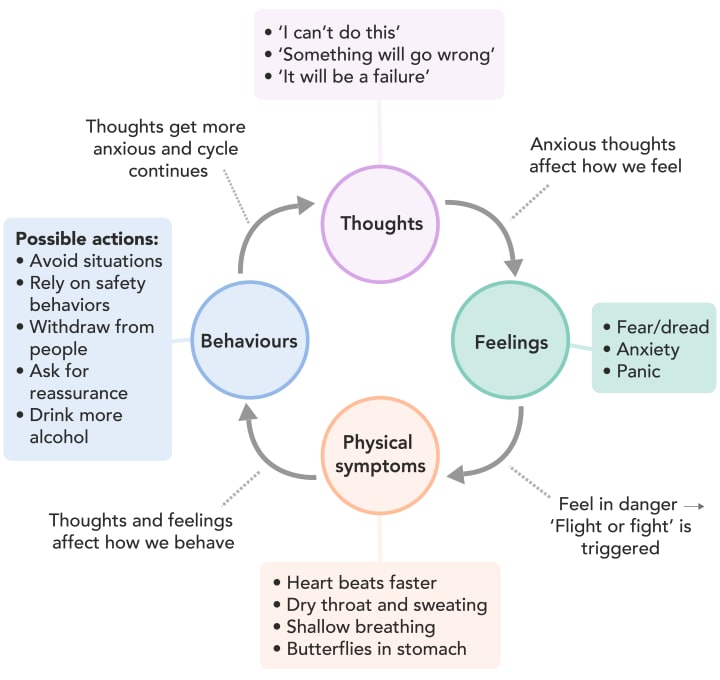Test Anxiety: What is it & How to Handle it
What is text/academic anxiety? How do we handle it?

What is test/academic anxiety?
Test anxiety, or academic anxiety, can come from a variety of factors and impact academic performance. Some physical symptoms of academic/test anxiety include headache, nausea, excessive sweating, shortness of breath, rapid heartbeat, lightheadedness/feeling faint. These can occur no matter how prepared you are for the test. Some emotional symptoms of academic, or test anxiety include anger, which could be directed at the teacher or yourself, helplessness, with a mentality of “I’m never going to understand this, so why try?”, fear, specifically of failure, for example, and disappointment in oneself or disappointment coming from others, such as family. Some behavioral/cognitive symptoms include difficulty concentrating, thinking negatively, and comparing yourself to others. You need to remind yourself that everyone is different, and comparison merely creates more anxiety.

How we do begin to deal with test/academic anxiety?
Acknowledging if you have test/academic anxiety, and having a sense of where you’re at as an individual, are the first steps towards success and management of our issues. The two components of test anxiety are emotionality, which involves physical and emotional symptoms, and behavioral and cognitive effects, which come from the vicious cycle of anxiety. This cycle includes a trigger, followed by fear, followed by stress, followed by worry, followed by anxiety, and then it repeats until you break out of it. You change these symptoms and stop these cycles by changing the way you think or changing your cognition. You can do that by maintaining continuous positive dialogue. Then you can start to change the way you feel and the way things affect you. Then, you can start to change your behavior, including your actions and reactions.

It’s important to discover your own best, which involves identifying strengths and weaknesses in regards to taking tests, identifying the relationship you see between your body’s reactions and the way you prepare for tests, e.g. the best time to take tests or the best approach, and identifying your preferred learning style–visual, auditory, tactile, kinesthetic. It also involves identifying if you’re intrinsically or extrinsically motivated and how that source of motivation impacts testing tests or your ability to study for tests, as well as identifying changes you can make in the way you prepare for tests that will help you take advantage of and utilize your learning style preferences. Learning disabilities, such as dyslexia, can affect test/academic anxiety, and it’s important to address if one has a learning disability, potentially get diagnosed, and utilize coping strategies for managing their disability.
How to get ready for a test:
- Review class lesson plans before class.
-Take quick notes with text-like abbreviations (w/, u, b4, btw, etc).
-Read class material before class.
-Take notes that aren’t in the book, and highlight parts of the book the teacher emphasizes.
-If the instructor has repeated it more than twice, it’ll probably be on the test.
-Study for at least 4 hours a day leading up to the test.

Good study habits:
-Studying comes before social activities
-Plan your breaks based on life schedules
-SAVE everything when you’re working on it
-Avoid plagiarism – double check citations and sources for accuracy
-Use your RESOURCES
Tips for general student success:
-Time management/set schedules (study on work breaks, understand prior commitments, and study around them)
-Be in contact with your instructor as often as possible (use your resources)
-Place all important dates for school in your main planner/calendar
-Remember this is your second job–it’s a priority
-Find ways to REST – don’t ever be tired while taking a test
Stay away from:
-distractions – TV, movies, non-soothing music, computer games, annoying people
-studying while tired; recharge your battery and find ways to gain energy so you can stay focused, like power naps and a full, good night’s sleep
-cramming – don’t procrastinate studying; you will not remember much, especially for your future career
-abusing substances (excessive caffeine, alcohol, drugs, etc)
Managing Procrastination:
Focus on one task at a time; clear your desktop to stay focused on coursework. Take mini (5-15 minute) breaks doing something completely unrelated to studying. Be positive and enthusiastic about the coursework. Reward yourself–have a reward system for your accomplishments. Remind yourself that there's no need to be perfect–perfection isn’t attainable or real, so just do it, do your best, and don’t strive for perfection.

Last Words
Ultimately, test anxiety, procrastination, or any unhealthy habit is a learned response that can be unlearned and broken with time, effort, patience, and determination.
About the Creator
zoe frenchman
I’m Zoe, I’m 21, and I’m an aspiring writer, filmmaker, musician, & mental health advocate. I’m a poet and content writer currently enrolled in the Creative Writing BFA program at Full Sail U!






Comments
There are no comments for this story
Be the first to respond and start the conversation.